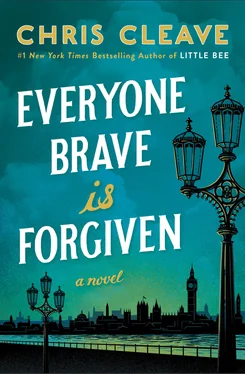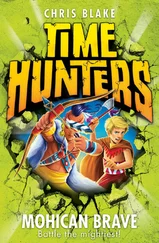… is a vigilant chaperone and that your dancing is improving.
He leaned his forehead against the train window, breathing hard. He watched the green fields rush by. Only this was real, he told himself: this ripening wheat, that flint-walled barn, those ewes. What he had not understood, before battle, was that time could become a ribbon to be looped and pinned back to its center, the petals of a black rosette.
I won’t cramp your style with that girl of yours, so I shan’t stay at the garret. I shall stay at Robertson’s — that little hotel on Shooter’s Hill Road. Call for me there when you get this.
The train hissed into Charing Cross. Alistair folded the note for Tom into its envelope, took his duffel bag from the rack, and stepped down onto the platform.
It was hot in London. He walked north from the station — at noon, by his watch — but no clocks struck. The bells were blanketed in their belfries, to be rung only if the enemy invaded. Such plans were a comfort to civilians, he supposed, although having met the Germans in their present humor, Alistair felt it unlikely that bells would make much difference whether silenced, rung or melted down and made into metal plates for tap shoes.
He found a postbox, hesitated, and put the note for Tom back in his pocket. Perhaps he should make sure of a room at Robertson’s before he told Tom to meet him there. They usually did have rooms, but with the war, one never knew.
With his handkerchief he wiped away the sweat and the train soot. In the Strand, bodies careened off him. Everyone jostled and bumped. There was a new way of moving that he could not seem to weave himself into. The city was in a gasping hurry but it wasn’t the old surge of rush hour, in which the great press of bodies used to flow together like a tide. Now everyone seemed to be moving at cross purposes.
Alistair fought a rising perplexity. He couldn’t thread himself through the new crowds. There were so many people, all out of phase. It seemed to him that the unrung hours had lost their habit of strict separation and begun to overlap, to slide over each other like the scales of something serpentine and recursive. Day shifts and night shifts and swing shifts perplexed him, and as he ran his errands across the capital it seemed that whatever bus he caught was full of wan girls in overalls. They were as likely to be coming from work as going to it. He tried to talk with them, but apparently the language had changed. The English he spoke seemed to amuse them or to irk them. It was as if he had learned it abroad.
“Have you come far?” he asked a young man in a tin hat and tweed.
“What?” said the man, eyeing him warily.
Alistair was used to the battle-shocked look in his men. His own commanding officer had been killed at Saint-Quentin, when the enemy had found their range with mortars. Keen to move out and getting no answer on the field telephone, Alistair had jogged half a mile to ask for orders in the stone barn where their command position had been established. When he arrived, the place stank of meat and there was no one alive in it. A mortar round had gone through the roof and the stone walls had contained the blast. The air was still hot. All his senior officers lay rent and scorched. The colonel sat upright at a camp table, bloodless and gray, the line of his mustache expressing indignation, the handset of the field telephone still clasped in his hand. This is a dreadful hotel and I wish to complain about the incessant noise .
He jogged back to his position, assembled everyone who was still alive in the company, and led them to the coast. All the way he hoped to meet a senior officer with a better plan. He only stopped, after ten days, when he reached the main force at Dunkirk. Two of his sergeants were gone, along with five of the corporals. Most of the men were injured, and six would need to be carried to the boats. Alistair oversaw the construction of stretchers.
It relaxed him, working with the men on these practical and necessary tasks. It was only in such matters that he felt useful. He was good at restoration. If the task had been, say, to rebuild Europe rather than to blast it to pieces, Alistair might have worn his rank with more pleasure and felt less bashful about asking the men to follow him.
As it was, though, they seemed happy enough to take his lead. They marched when he asked them to march. They continued to fire their rifles at the enemy rather than at each other, even after a month with little sleep. They drank sandy tea, flinched at the worst bangs, and wrote letters to their girlfriends at home. When he made his rounds they called him sir, offered him brews and biscuits, and were glad when he dropped in to their dugouts. That his presence seemed to help them was reason enough to keep going. For their sake he hoped he would not be killed — the issue had ceased to interest him personally. He tried to do his best for them and to soothe them when they looked back at him with this wide-eyed stare.
The young man before him was alarmed. Alistair took the man’s arm, thinking to reassure him, but the fellow pushed him away and hurried off along the length of the bus. Alistair blinked. Of course: a bus. London.
He got off as soon as the bus slowed. In the street, nothing was right. The cigarettes smelled of burning farms. Passersby perplexed him with musk and naphtha. The bakeries, which had always operated at dawn, now seemed to be baking again in the late afternoon. He supposed all the new night workers must need feeding. The smell of warm bread filled Piccadilly as he walked to his bank. It was comforting and unsettling, both at once. The bakers on their shopwindow slates chalked the batch up as Resurrection Bread and when Alistair asked one of them why, the man told him: “Lo, it has risen again.”
Even at the Ritz the dining times had been doubled up to accommodate the new martial schedules. Alistair looked in through the tall windows and saw ladies laughing around cake stands and samovars, beside tables of men who were still finishing lunch. When port and macaroons were simultaneously visible in W1 then something dreadful was coming down the line, surely. Why did people seem so unconcerned?
Alistair loosened his tie in the heat and walked down to the Embankment, taking the side streets to avoid the bedeviling crowds. Now that his small tasks were done, he felt surplus and foolish. He sat on a bench and frowned at the Thames. An oily tide was coming in from the estuary, setting up a confused chop against the river’s flow. The white gulls lurched about on it, looking seasick and hot.
He had imagined it would take all afternoon to meet with his bank manager, his tailor and the family’s lawyer, but in the event he had only been a few minutes with each before he had been on his way again. They had all received him cordially, but with glances at the clock. He had the impression of being closely followed around town by some more important and indefinable presence that had made a proper appointment. Perhaps the war was good for business. Perhaps it would be even better if it weren’t for all these soldiers in the way.
Alistair watched the queasy gulls squabble and bob. In the hot afternoon he lurched in and out of time. He had telephoned and got a room at Robertson’s but he still held off posting his note to Tom, deciding to wait until he felt steadier. He didn’t much fancy seeing his old colleagues at the Tate, either. The only thing worse than finding the place depressing and empty would be to discover that they had brought the pictures back after all. He didn’t feel like seeing anyone he knew. The city had him on the back foot.
He watched the brown water swirl. On the way back from Dunkirk, crossing the Channel in a wet mist lit with flashes of white and red, they had picked up a downed RAF man in a tiny yellow rubber dinghy, waving. Alistair had helped him to climb up the netting into their little boat. Shivering, still in his parachute harness and Mae West, the man’s face and arms were black with oil. He gave a salute, which Alistair returned. Alistair found the man some blankets and a tarpaulin to keep the wind off. It turned out that between them they had the makings of a smoke — the airman’s pipe was undamaged and Alistair’s tobacco dry. They shared the pipe at the foot of the mast, without speaking.
Читать дальше












